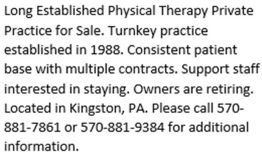Legislative Update May 2023I want to thank those who completed the member survey. It gives the Board direction for the Strategic Plan and your thoughts on legislative initiatives. Below is an update on the legislative and regulatory actions we are currently following. Direct Access The survey demonstrated the direction you want us to pursue. As a reminder, during the last legislative cycle, we did propose a Direct Access bill. This bill needed to clear the Senate Consumer Protection and Licensure Committee. Because of this, the full Senate did not vote on the bill. APTA PA is currently in the final stages of identifying a legislator to sponsor a new bill for 2023-2024. Once we have a bill number, the plan will be to announce to the membership with a request to contact appropriate legislators. Dry Needling We are expecting a bill to be presented in the Senate shortly. As a reminder this bill was voted to the full Senate last legislative cycle. The bill had 2 of the required 3 required "considerations," but the bill was not voted on for the required third consideration. We are expecting to be supportive of this action shortly. 4th Trimester Proclamation APTA PA is in contact with the leadership and actively looking for a new legislative sponsor, as this action was delayed last term. We are also closely following national legislation with potential exposure and additional opportunities. Compact Licensure APTA PA's legal team has been in contact with Pennsylvania's executive administration. Multiple medical organizations are also sponsoring Compact legislation. We are waiting for confirmation as to whether the current administration will support Compact licensure for Pennsylvania PT/PTAs. Athletic Trainer Expansion of Scope Legislation Senator Baker has introduced SB 559 and SB 600. Currently, we are opposed to this expansion of the definition of a "Physically Active Person." We are not opposed to the AT profession but to the following definition as currently proposed in the bill – "Physically active person" An individual who engages in an activity associated with exercise, sports, recreation or a vocation that requires a level of strength, endurance, flexibility, range of motion, speed or agility. We have met with the Pennsylvania Athletic Trainers Society. We have agreed to the bill's emergency provisions and are negotiating the language of the physically active person. We have further stakeholder meetings scheduled for early June 2023. Regulations The regulatory process is slowly moving toward allowing students to take the NPTE before graduation with College/University approval. Also, clinical educators being awarded continuing education credit for educating students in their clinical setting. This process can be slow, but so far the regulations are progressing. Thank you, and a call to action We need you to support our efforts to expand our ability to serve. We will be reaching out with a request to contact your local Senator or Representative on one or more of the above issues. They will listen to you as a constituent as you tell our story of the quality of our education and service to patients and the community. Contact me at [email protected] with any questions or comment on APTA PA’s legislative agenda. Scott Voshell DPT, MHS |

